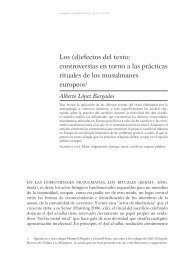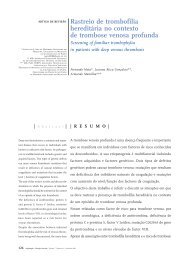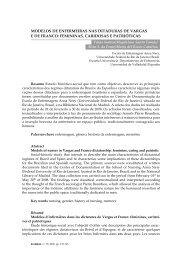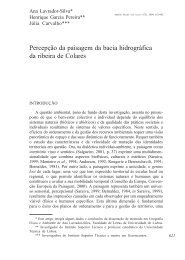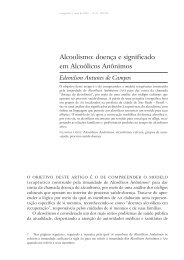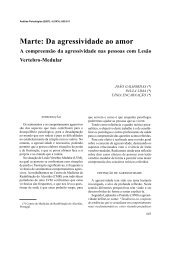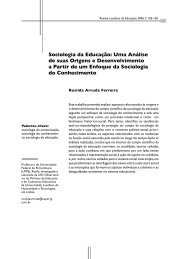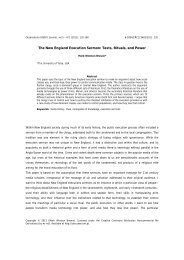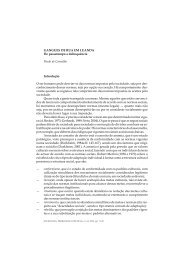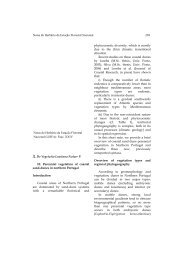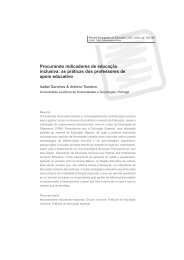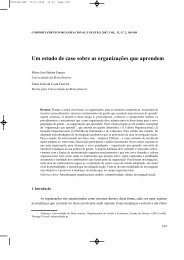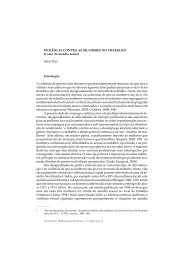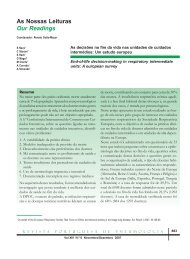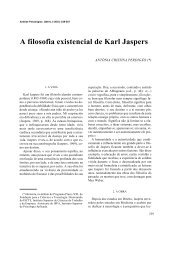O fim da Guerra Fria e a unificação alemã - SciELO
O fim da Guerra Fria e a unificação alemã - SciELO
O fim da Guerra Fria e a unificação alemã - SciELO
You also want an ePaper? Increase the reach of your titles
YUMPU automatically turns print PDFs into web optimized ePapers that Google loves.
n o t a s<br />
1 agradeço a Pierre Hassner, vesselin<br />
dimitrov e carlos gaspar, assim como aos<br />
investigadores do ipri, os comentários a<br />
versões anteriores do artigo.<br />
2 sCHWarz, Hans-Peter – Die Zentralmacht<br />
Europas. Deutschlands Rückkehr auf<br />
die Weltbühne. berlim: siedler verlag,<br />
1994.<br />
3 ikenBerry, g. John – After Victory: Institutions,<br />
Strategic Restraint, and the Rebuilding<br />
of Order after Major Wars. Princeton: Princeton<br />
university Press, 2001.<br />
4 g. John ikenberry desenvolveu o conceito<br />
de «ordem constitucional» no seu livro<br />
After Victory: Institutions, Strategic Restraint,<br />
and the Rebuilding of Order after Major Wars.<br />
ikenberry define ordens constitucionais<br />
como «ordens políticas organiza<strong>da</strong>s em<br />
redor de instituições legais e políticas que<br />
operam para atribuir direitos e limitar o<br />
exercício do poder. […] os riscos <strong>da</strong> competição<br />
política são reduzidos pela criação<br />
de processos de participação e decisão<br />
institucionalizados que especificam regras,<br />
direitos e limites aos governantes»<br />
(p. 29).<br />
5 Bozo, frédéric, rey, marie-Pierre, luDloW,<br />
N. Piers, e nuti, leopoldo (eds.) –<br />
Europe and the End of the Cold War: A<br />
Reappraisal. routledge, 2008; Brooks,<br />
stephen, e WoHlFortH William c. – «clarifying<br />
the end of cold War debate». in Cold<br />
War History. vol. 7, N.º 3, 2007, pp. 447-454;<br />
Davis, James W., e WoHlFortH William c.<br />
– «german unification». in Herrmann,<br />
richard K., e leBoW, richard Ned (eds.) –<br />
Ending the Cold War: Interpretations, Causation,<br />
and the Study of International Relations.<br />
Nova York: Palgrave macmillan, 2004; gaD-<br />
Dis, John lewis – The United States and the<br />
End of the Cold War. oxford: oxford university<br />
Press, 1992; Hogan, michael J. (ed.) – The<br />
End of the Cold War: Its Meaning and Implications.<br />
cambridge, uK: cambridge university<br />
Press, 1992; leBoW, richard N., e rissekappen,<br />
thomas (eds.) – International Relations<br />
Theory and the End of the Cold War. Nova<br />
York: columbia university Press, 1995;<br />
WoHlFortH, William c. – «realism and the<br />
end of the cold War». in International Security.<br />
vol. 19, N.º 3, 1994, pp. 91-129; Brooks,<br />
stephen brooks, e WoHlFortH William c.<br />
– «Power, globalization and the end of the<br />
cold War». in International Security. vol. 25,<br />
N.º 3, 2000-2001, pp. 5-53; englisH, robert<br />
– «Power, ideas and new evidence on the<br />
cold War’s end: a reply to brooks and Wohlforth».<br />
in International Security. vol. 26,<br />
N.º 4, 2002, pp. 70-92.<br />
6 Waltz, Kenneth – «the emerging structure<br />
of international politic». in International<br />
Security. vol. 18, N.º 2, 1993, pp. 44-79; Baring,<br />
arnulf (ed.) – Germany’s New Position in<br />
Europe: Problems and Perspectives. oxford:<br />
berg, 1994; HaCke, christian – Weltmacht<br />
wider Willen: Die Aussenpolitik der Bundesrepublik<br />
Deutschland. frankfurt am main:<br />
ullstein, 1993; sCHWarz, Hans-Peter – Die<br />
Zentralmacht Europas. Deutschlands Rückkehr<br />
auf die Weltbühne.<br />
7 mearsHeimer, John – «back to the<br />
future: instability in europe after the cold<br />
War». in International Security. vol. 5, N.º 56,<br />
1990, p. 9.<br />
8 HyDe-priCe, adrian – «’Normative’<br />
power europe: a realist critique». in Journal<br />
of European Public Policy. vol. 13, N.º 2,<br />
março de 2006, pp. 217-234.<br />
9 HoFFmann, stanley – The European<br />
Sisyphus. são francisco: Westview Press,<br />
1995, p. 283.<br />
10 risse, thomas – «the cold War’s endgame<br />
and german unification». in International<br />
Security. vol. 21, 4, Primavera de 1997.<br />
pp. 159-185.<br />
11 ikenBerry; g. John – After Victory: Institutions,<br />
Strategic Restraint, and the Rebuilding<br />
of Order after Major Wars; leBoW, richard<br />
Ned – «the long peace, the end of the cold<br />
War, and the failure of realism». in International<br />
Organization. vol. 48, N.º 2, 1994, pp.<br />
249-277; janning, Josef – «a german<br />
europe – a european germany? on the<br />
debate over germany’s foreign policy». in<br />
International Affairs. vol. 72, N.º 1, 1996,<br />
33-41; maull, Hanns – «germany and<br />
Japan: the new civilian powers». in Foreign<br />
Affairs. vol. 69, N.º 5, 1990, pp. 91-106;<br />
risse, thomas – «the cold War’s endgame<br />
and german unification», pp. 159-185.<br />
12 katzenstein, Peter (ed.) – The Culture<br />
of National Security. Norms and Identity in<br />
World Politics. Nova York: columbia university<br />
Press, 1996. ruggie, John g. – Constructing<br />
the World Polity. Essays on<br />
International Institutionalization. londres:<br />
routledge, 1998; WenDt, alexander – «identity<br />
and structural change in international<br />
politics». in lapiD, Yosef, e kratoCHWil,<br />
friedrich (eds.) – The Return of Culture and<br />
Identity in IR Theory. boulder: lynne rienner,<br />
1996; ForsBerg, thomas – «economic<br />
incentives, ideas, and the end of the cold<br />
War: gorbachev and german unification». in<br />
Journal of Cold War Studies. vol. 7, N.º 2,<br />
2005, pp. 142-164.<br />
13 bibliografia sobre o processo de <strong>unificação</strong><br />
<strong>alemã</strong>: jaeger, Wolfgang – Die Uberwindung<br />
der Teilung. Der innerdeutsche<br />
Prozess der Vereinigung 1989/90. estugar<strong>da</strong>:<br />
deutsche verlags-anstalt, 1998; kaiser,<br />
Karl – Deutschlands Vereinigung. Die internationalen<br />
Aspekte. bergisch gladbach: gustav<br />
lubbe verlag, 1991; ponD, elizabeth –<br />
Beyond the Wall: Germany’s Road to Unification.<br />
Washington dc: brookings, 1993;<br />
szaBo, stephen – The Diplomacy of German<br />
Unification. Nova York: st. martin’s Press,<br />
1992; koHl, Helmut – Ich wollte Deutschlands<br />
Einheit; teltsCHik, Horst – 329 Tage:<br />
Innenansichten der Einigung. berlim: siedler,<br />
1991.<br />
14 citado em Der Spiegel, 39/1989, 25 de<br />
setembro de 1989, pp. 16-17.<br />
15 asH, timothy garton – «the chequers<br />
affair». in New York Review of Books, 27 de<br />
setembro de 1990. in james, Harold, e<br />
stone, marla (eds.) – When the Wall Came<br />
Down. Reactions to German Unification.<br />
londres: routledge, 1992, pp. 242-246. Para<br />
uma crítica feroz cf. o’Brien, conor cruise<br />
– «beware, the reich is reviving». in Times,<br />
31 de outubro de 1989. in james, Harold,<br />
e stone, marla (eds.) – When the Wall came<br />
down. Reactions to German Unification,<br />
pp. 221-223.<br />
16 Bozo, frédéric – «france, german unification,<br />
and european integration», e<br />
lévesque, Jacques – «german unification<br />
between the superpowers in the name of<br />
europe’s future: soviet, french, and british<br />
qualms about Kohl’s rush to german unification».<br />
in Bozo, f. et al. – Europe and the<br />
End of the Cold War: A Reappraisal. londres:<br />
routledge, 2008.<br />
17 No conselho europeu de estrasburgo de<br />
8 de dezembro de 1989 os chefes de estado<br />
e de governo <strong>da</strong> Cee decidiram, contra a voz<br />
do reino unido, a realização de uma Cig<br />
para a criação <strong>da</strong> uem.<br />
18 HoFFmann, stanley – «france. two<br />
obsessions for one country». in pastor,<br />
robert a. (ed.) – A Century’s Journey: How<br />
the Great Powers Shape the World, 1999,<br />
pp. 63-89.<br />
19 sauDer, axel – Souveränität und Integration.<br />
Französische und deutsche Konzeptionen<br />
europäischer Sicherheit nach dem Ende des<br />
Kalten Krieges (1990-1993). baden-baden:<br />
Nomos, 1995, p. 36.<br />
20<br />
HutCHings, robert – American Diplomacy<br />
and the End of the Cold War: An Insider’s Account<br />
of U.S. Policy in Europe, 1989-1992. baltimore:<br />
Johns Hopkins university Press, 1997, cf.<br />
cap. 3 sobre a diplomacia <strong>da</strong> re<strong>unificação</strong><br />
<strong>alemã</strong>. Hutchings foi director para assuntos<br />
europeus no conselho de segurança<br />
Nacional americano entre 1989 e 1992.<br />
21<br />
FrienD, Julius – Unequal Partners:<br />
French-German Relations, 1989-2000.<br />
londres: Praeger, 2001, p. 57.<br />
22<br />
ponD, elizabeth – The Rebirth of Europe.<br />
Washington dc: brookings institution Press,<br />
1999, p. 42. cf. também Bozo, frédéric –<br />
«mitterrand’s france, the end of the cold<br />
War, and german unification: a reappraisal».<br />
in Cold War History. vol. 7, N.º 4, 2007,<br />
pp. 455-478; HutCHings, robert – American<br />
Diplomacy and the End of the Cold War: an<br />
insider’s account of u.s. Policy in europe,<br />
1989-1992.<br />
23<br />
é este um dos argumentos recentes de<br />
frédéric bozo. analisando a política europeia<br />
<strong>da</strong> frança em 1989-1990, bozo conclui que<br />
a diplomacia francesa marcou decisivamente<br />
a integração europeia, enquanto que nunca<br />
tentou atrasar ou mesmo impedir o processo<br />
de <strong>unificação</strong> <strong>alemã</strong>. Bozo, frédéric –<br />
«mitterrand’s france, the end of the cold<br />
War, and german unification: a reappraisal»,<br />
pp. 455-478.<br />
24<br />
elBe, frank, e kiessler, richard – A<br />
Round Table with Sharp Corners: The Diplo-<br />
relações internacionais setembro : 2009 23 050



